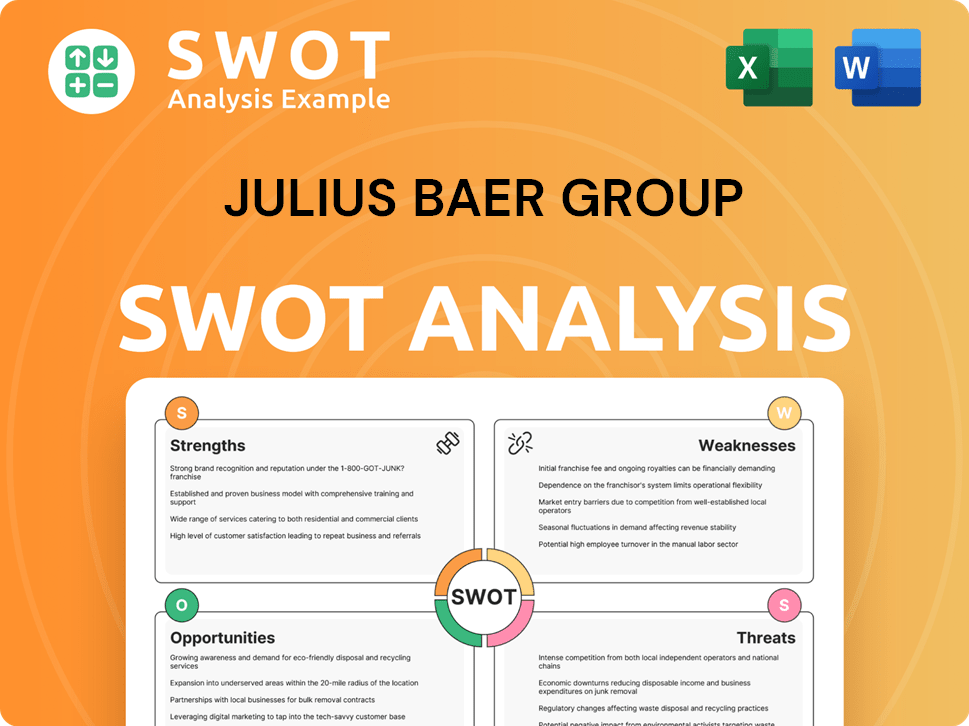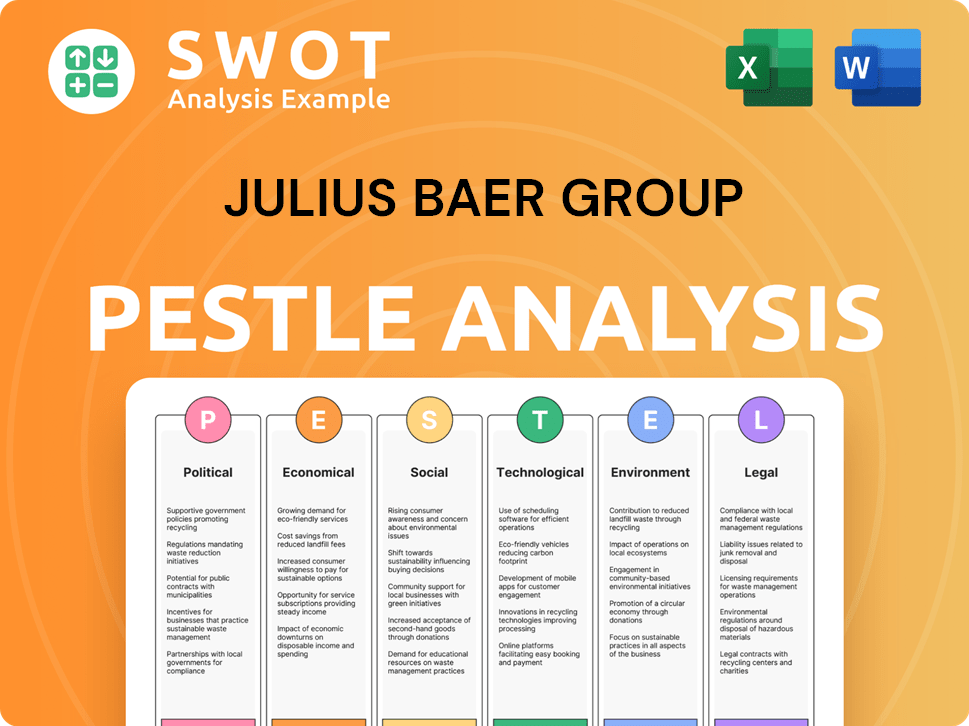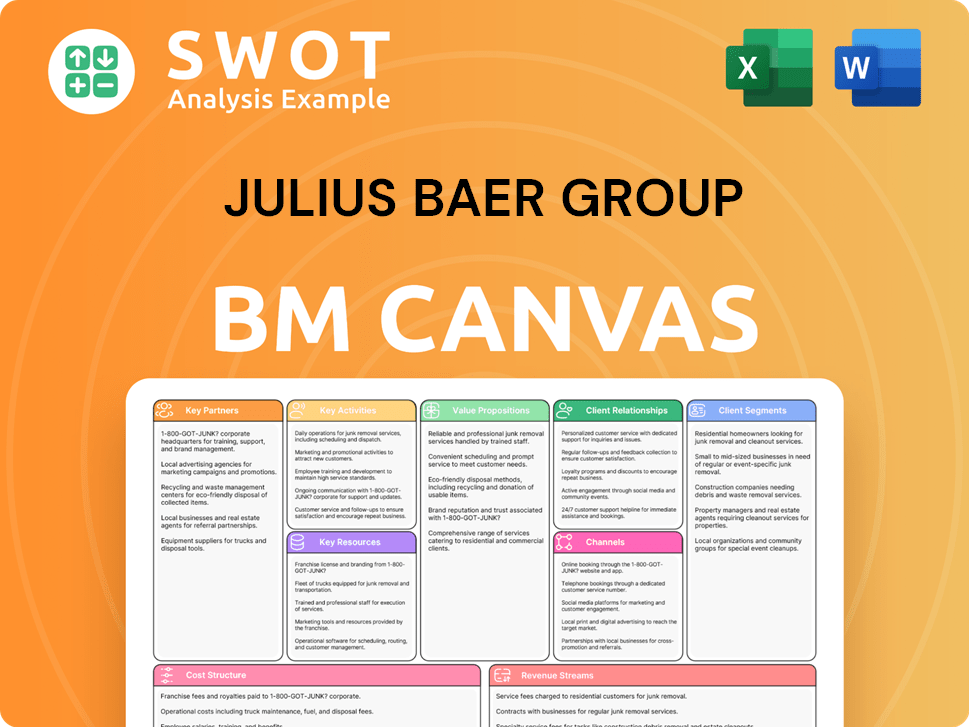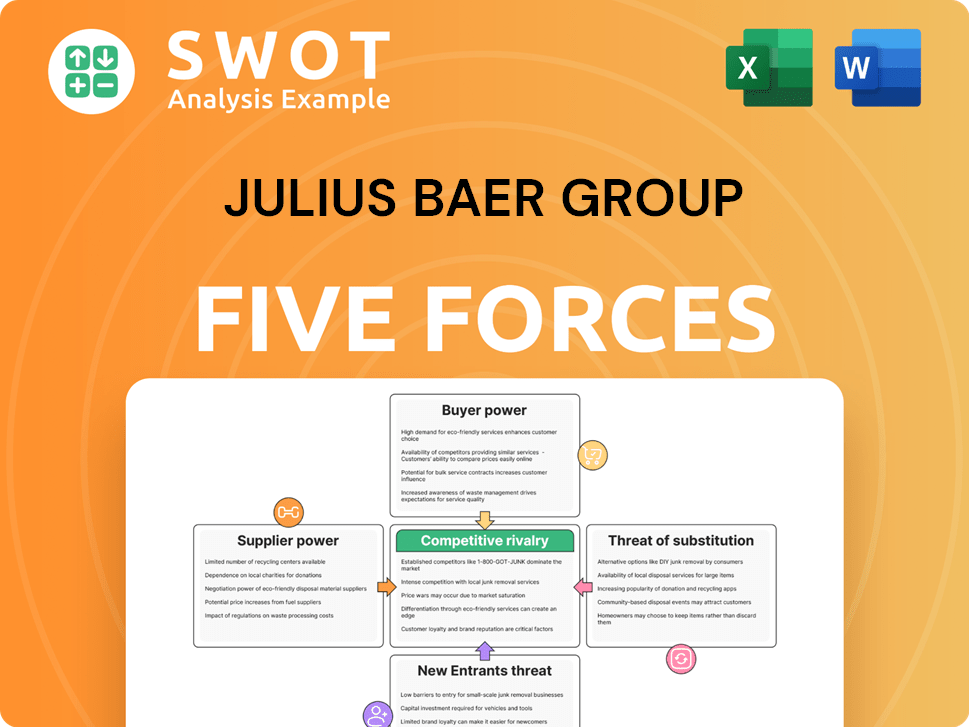Julius Baer Group Bundle
How Does Julius Baer Navigate the Cutthroat Wealth Management Arena?
The wealth management industry is undergoing a seismic shift, fueled by technological innovation and evolving client needs. As a prominent player in this dynamic landscape, Julius Baer Group SWOT Analysis reveals its competitive position. Founded in 1890, Julius Baer has transformed from a Swiss bank into a global wealth management specialist, serving high-net-worth clients worldwide.

This analysis will explore the Julius Baer competitive landscape, identifying its key Julius Baer competitors within the wealth management industry and dissecting the factors that contribute to its success. We'll delve into Julius Baer Group analysis, examining its Julius Baer's competitive advantages and Julius Baer's global presence compared to competitors within the private banking market. Understanding Julius Baer's strengths and weaknesses is crucial in evaluating its strategic positioning and future outlook within the financial services competition.
Where Does Julius Baer Group’ Stand in the Current Market?
The Julius Baer Group holds a prominent position in the global wealth management industry, specializing in private banking services. Its core operations revolve around providing tailored financial solutions to high-net-worth (HNW) and ultra-high-net-worth (UHNW) individuals and families. The firm's value proposition centers on delivering personalized wealth planning, investment solutions, and discretionary mandates, catering to the complex needs of its affluent clientele.
As of December 31, 2023, Julius Baer managed assets totaling CHF 427 billion (approximately USD 488 billion). This positions the group among the leading wealth managers worldwide, although it operates with a more focused approach compared to larger universal banks. The company's strategic focus allows it to maintain a strong competitive edge within the niche of affluent wealth management. For a deeper understanding of their operational model, consider exploring the Revenue Streams & Business Model of Julius Baer Group.
Geographically, Julius Baer has a significant presence in key wealth hubs, including Switzerland, Europe, Asia, and Latin America. Asia, in particular, is a crucial growth market for the firm, contributing significantly to its overall assets under management and client base. The company's financial health is generally robust, characterized by strong capital ratios and profitability, often exceeding industry averages for pure-play wealth managers. Julius Baer reported a net profit of CHF 470 million for the full year 2023.
The Julius Baer competitive landscape is shaped by its market share within the private banking market. While specific market share figures fluctuate, Julius Baer consistently ranks among the top global wealth managers. Its focus on HNW and UHNW clients allows it to maintain a strong position despite not competing on the same scale as larger universal banks.
Julius Baer's competitive advantages include its specialized focus, strong brand reputation, and extensive global presence. The company excels in providing personalized services and investment solutions tailored to the sophisticated needs of its affluent clients. Its robust financial performance and focus on client relationships further strengthen its position.
Julius Baer's global presence is particularly strong in key wealth management hubs. Switzerland remains a central location, while Europe, Asia, and Latin America are also important regions. The firm strategically expands its footprint in high-growth markets, such as Asia, to capitalize on increasing wealth in these areas.
The company has embraced digital transformation to enhance client experience and operational efficiency. Julius Baer invests in technology to provide digital interactions alongside personalized advice. This adaptation to evolving client preferences is crucial for maintaining a competitive edge in the wealth management industry.
The Julius Baer competitors include a mix of global and regional players in the private banking market. These rivals compete for the same affluent client base, offering similar services.
- UBS: A major global player with a significant wealth management division.
- Credit Suisse (now part of UBS): Another major global wealth manager.
- Other Swiss Private Banks: Including Pictet and Lombard Odier.
- International Banks: Such as Morgan Stanley and Goldman Sachs, with wealth management arms.
Julius Baer Group SWOT Analysis
- Complete SWOT Breakdown
- Fully Customizable
- Editable in Excel & Word
- Professional Formatting
- Investor-Ready Format

Who Are the Main Competitors Challenging Julius Baer Group?
The Julius Baer competitive landscape is shaped by a diverse array of financial institutions vying for the attention of high-net-worth (HNW) and ultra-high-net-worth (UHNW) individuals. This competitive environment includes traditional private banks, global financial institutions, and emerging FinTech players. Understanding these competitors is crucial for assessing Julius Baer's market position and strategic direction.
The wealth management industry is highly competitive, with firms continually striving to attract and retain affluent clients through a combination of personalized service, investment expertise, and global reach. The private banking market is particularly concentrated, with a few major players commanding significant market share. The competitive dynamics are constantly evolving due to mergers, acquisitions, and technological advancements.
Julius Baer Group analysis reveals that its key rivals include both established and emerging players in the financial services competition. These competitors employ various strategies, from aggressive expansion to specialized service offerings, to gain a competitive edge. The following sections detail the main rivals and the competitive landscape.
Direct competitors are those that offer similar wealth management services to HNW and UHNW clients. These firms often have a strong presence in the private banking market and compete directly with Julius Baer for clients and assets under management (AUM).
UBS is a major Swiss private bank and a direct competitor. Following its acquisition of Credit Suisse, UBS has significantly expanded its AUM and global reach. As of Q1 2024, UBS reported approximately $5.0 trillion in invested assets. This scale allows UBS to offer a wide range of services and compete aggressively for market share.
Pictet Group is an independent private bank with a long-standing heritage, focusing on HNW and UHNW clients. Pictet competes on reputation, personalized service, and investment expertise. The firm had CHF 610 billion in assets under management as of December 31, 2023.
Lombard Odier is another independent Swiss private bank. It focuses on providing wealth management services to affluent clients. Lombard Odier had CHF 349 billion in client assets as of December 31, 2023.
EFG International is a global private banking group. It offers wealth management services to a diverse client base. EFG International's total assets under management were CHF 147.5 billion as of December 31, 2023.
Indirect competitors include wealth management divisions of large global financial institutions and emerging FinTech companies. These firms may offer different services or target different segments of the wealth management market, but they still compete for client assets.
Large financial institutions leverage their extensive global networks and diverse product offerings to attract and retain affluent clients. They often have strong investment banking capabilities and a wide range of financial products.
- J.P. Morgan Private Bank: J.P. Morgan Private Bank is a significant player in the wealth management industry, offering a comprehensive suite of services to high-net-worth individuals and families. As of Q1 2024, J.P. Morgan's Wealth & Asset Management division reported $4.6 trillion in client assets.
- Goldman Sachs Private Wealth Management: Goldman Sachs Private Wealth Management provides wealth management services to high-net-worth clients. The firm leverages Goldman Sachs' investment banking and trading capabilities. In 2023, Goldman Sachs' Asset & Wealth Management division reported assets under supervision of $2.8 trillion.
- Morgan Stanley Wealth Management: Morgan Stanley Wealth Management serves high-net-worth individuals and families. Morgan Stanley has a vast network of financial advisors and a wide range of investment products. As of Q1 2024, Morgan Stanley Wealth Management reported client assets of approximately $5.0 trillion.
Julius Baer Group PESTLE Analysis
- Covers All 6 PESTLE Categories
- No Research Needed – Save Hours of Work
- Built by Experts, Trusted by Consultants
- Instant Download, Ready to Use
- 100% Editable, Fully Customizable

What Gives Julius Baer Group a Competitive Edge Over Its Rivals?
The competitive advantages of Julius Baer are centered around its specialized focus, strong brand, and client-centric approach. As a pure-play wealth manager, it differentiates itself by concentrating resources exclusively on high-net-worth individuals, unlike universal banks with diverse business lines. This specialization allows for deeper client relationships and trust, which are vital in the wealth management industry. Analyzing the Julius Baer competitive landscape reveals these strengths are continuously refined to meet evolving client needs.
The 'Swiss banking' reputation, known for stability and discretion, enhances its appeal, especially for international clients. The company also benefits from an experienced team of relationship managers and investment professionals, offering tailored services that are hard for less specialized firms to replicate. This personalized approach, combined with a robust advisory framework, fosters strong client loyalty. Strategic investments in technology further support service delivery and client engagement, enhancing its competitive edge against traditional and emerging rivals.
To understand the Julius Baer Group analysis, it's essential to recognize its commitment to providing bespoke wealth management solutions. This includes comprehensive wealth planning, customized investment strategies, and discretionary portfolio management. The company's ability to adapt and innovate, particularly in its digital offerings, is crucial for maintaining its competitive position in the evolving wealth management industry.
Julius Baer's focus solely on wealth management allows for specialized expertise and resources. This model fosters strong client relationships and trust, key elements in the private banking market. The company's dedication to this model allows it to offer highly tailored services.
The 'Swiss banking' brand is synonymous with stability, discretion, and expertise. This reputation attracts international clients seeking a secure haven for their assets. This brand recognition is a significant advantage in the financial services competition.
A team of experienced relationship managers and investment professionals provides highly tailored services. Their expertise in complex wealth planning and investment solutions is a key differentiator. This personalized approach leads to strong client loyalty.
Investments in technology enhance the digital client experience and operational efficiency. Data analytics and digital platforms support improved service delivery and client engagement. These investments complement the human advisory model.
Julius Baer's competitive advantages are multifaceted, encompassing its specialized business model, strong brand, and client-focused approach. These elements work together to create a sustainable competitive edge in the wealth management sector. The company's ability to adapt to market changes and client needs is crucial for its long-term success.
- Pure-play wealth management focus allows for specialized expertise.
- The 'Swiss banking' brand enhances trust and attracts international clients.
- Experienced teams offer personalized services and build strong client relationships.
- Strategic technology investments improve service delivery and client engagement.
- Continuous refinement of service offerings and global expansion.
Julius Baer Group Business Model Canvas
- Complete 9-Block Business Model Canvas
- Effortlessly Communicate Your Business Strategy
- Investor-Ready BMC Format
- 100% Editable and Customizable
- Clear and Structured Layout

What Industry Trends Are Reshaping Julius Baer Group’s Competitive Landscape?
The Julius Baer competitive landscape is shaped by its position within the wealth management industry, a sector characterized by intense competition and evolving client demands. The company faces risks from economic uncertainties, regulatory changes, and technological disruptions. Its future outlook depends on its ability to adapt to these challenges while capitalizing on emerging opportunities.
The private banking market is experiencing significant shifts, with digital transformation and changing client preferences driving innovation. Julius Baer Group analysis reveals the need for strategic agility to maintain its competitive edge and ensure sustainable growth. The firm must balance its traditional strengths with the demands of a rapidly changing financial landscape.
The wealth management industry is witnessing significant technological advancements, including AI and data analytics, that are enhancing client experiences. Regulatory changes, such as stricter compliance requirements, are increasing operational costs. Evolving consumer preferences, especially among younger clients, are driving demand for transparency and sustainable investment options.
Geopolitical uncertainties and global economic shifts, including inflation and interest rate fluctuations, pose ongoing challenges. Maintaining the human touch while integrating digital solutions presents a significant hurdle. Competition from robo-advisors and digital-first platforms is intensifying, requiring continuous innovation. The need to navigate complex cross-border regulations adds to operational complexities.
Emerging markets, particularly in Asia and the Middle East, offer significant growth prospects. Expanding sustainable investment offerings and integrating digital solutions can attract new clients. Demonstrating expertise in navigating volatile markets and providing strategic advice is crucial. Strategic growth in key markets, enhancing digital capabilities, and expanding sustainable investment solutions are key.
Julius Baer is likely to focus on strategic growth in key markets to remain competitive. Enhancing digital capabilities and expanding sustainable investment solutions are critical. Maintaining a strong client-centric approach is essential. The company's competitive position will evolve based on its ability to adapt and innovate.
To maintain its position, Julius Baer will likely emphasize strategic growth in key markets, enhance digital capabilities, and expand sustainable investment solutions. The wealth management industry's future is significantly influenced by technological advancements and evolving client expectations. The firm's ability to balance personalization with technological integration will be crucial.
- Focus on Asia and the Middle East for growth, leveraging existing presence.
- Invest in digital platforms and AI to enhance client experience and streamline operations.
- Expand sustainable investment offerings to meet growing client demand.
- Strengthen client-centric approach to maintain personalized service.
Julius Baer Group Porter's Five Forces Analysis
- Covers All 5 Competitive Forces in Detail
- Structured for Consultants, Students, and Founders
- 100% Editable in Microsoft Word & Excel
- Instant Digital Download – Use Immediately
- Compatible with Mac & PC – Fully Unlocked

Related Blogs
- What are Mission Vision & Core Values of Julius Baer Group Company?
- What is Growth Strategy and Future Prospects of Julius Baer Group Company?
- How Does Julius Baer Group Company Work?
- What is Sales and Marketing Strategy of Julius Baer Group Company?
- What is Brief History of Julius Baer Group Company?
- Who Owns Julius Baer Group Company?
- What is Customer Demographics and Target Market of Julius Baer Group Company?
Disclaimer
All information, articles, and product details provided on this website are for general informational and educational purposes only. We do not claim any ownership over, nor do we intend to infringe upon, any trademarks, copyrights, logos, brand names, or other intellectual property mentioned or depicted on this site. Such intellectual property remains the property of its respective owners, and any references here are made solely for identification or informational purposes, without implying any affiliation, endorsement, or partnership.
We make no representations or warranties, express or implied, regarding the accuracy, completeness, or suitability of any content or products presented. Nothing on this website should be construed as legal, tax, investment, financial, medical, or other professional advice. In addition, no part of this site—including articles or product references—constitutes a solicitation, recommendation, endorsement, advertisement, or offer to buy or sell any securities, franchises, or other financial instruments, particularly in jurisdictions where such activity would be unlawful.
All content is of a general nature and may not address the specific circumstances of any individual or entity. It is not a substitute for professional advice or services. Any actions you take based on the information provided here are strictly at your own risk. You accept full responsibility for any decisions or outcomes arising from your use of this website and agree to release us from any liability in connection with your use of, or reliance upon, the content or products found herein.